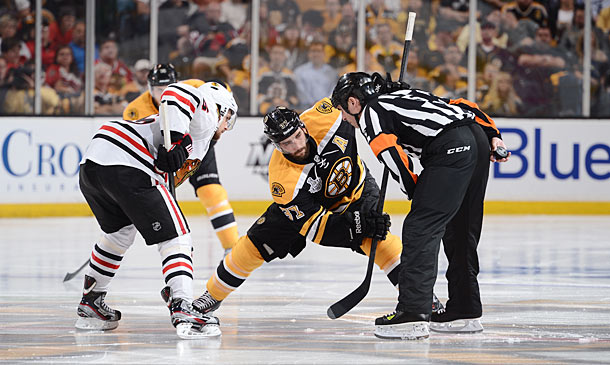
Stanley Cup Final: Blackhawks feel dotty after losing face-off battle in Game 3
Boston's Patrice Bergeron schooled the Blackhawks in the face-off circles on Monday night. (NHLI via Getty Images)
By Sarah Kwak
BOSTON — One team was guaranteed to be working itself out of a hole after Game 3. That it's Chicago has more than a little to do with the face-off totals in Boston’s 2-0 win at TD Garden on Monday night. The Blackhawks, who ranked No. 11 in the league with a 50.8 percent win rate during the regular season, let the top-ranked Bruins own the dots. Boston won 40 of the 56 total draws, an absurd 71 percent.
Center Patrice Bergeron, the 2012 Selke Trophy winner and this year’s runner-up, led the way for Boston by going 24-for-28, including 9-for-10 in the offensive zone. When a team like the Blackhawks relies largely on a puck-possession game, face-offs become critical, especially when it's struggling to generate offense. Starting most plays without the puck has been an added hindrance against Boston's stifling defense. In offensive zone draws, the Blackhawks were a dismal 6-for-23, allowing the Bruins to regularly take control and turn play the other way. Chicago's power play, which has sputtered along at 11.3 percent for the playoffs and 0-for-11 against the Bruins, has also suffered from an inability to win draws.
"It's tough to get a clean entry," Blackhawks coach Joel Quenneville explained on Tuesday. "I think we might have to get a little indirect plays to get possession on our entries. It starts with losing the draw initially. That's the area we have to get better. Hopefully you don't have to resort to the entry. We're still going to have to find a way to get through it and find ways to have possession ... I think we're looking at ways that we can at least get it closer to a 50/50 chance for us on most draws."
GAME 3: Cazeneuve's take | Report card | Recap | Boxscore | Highlights | Photos | Schedule
All season, the Blackhawks, the Western Conference's top offensive team, thrived when they were allowed to use their speed and play a fast transition game. When they get the puck deep behind the opposing net and establish a forecheck, they’re able to create skillful goals. There have been glimpses of that creativity in this series -- the first period of Game 2, for instance -- but when the Bruins are on their game, they wear teams down and they have made it much more difficult for Chicago to establish much offensively.
That's pretty much what the Bruins did to Pittsburgh. When asked why anyone should believe that the Blackhawks can do what the Penguins couldn’t, winger Dave Bolland didn’t really have an answer. “We’ll do it,” he declared simply, in a tone that belied the confidence of the statement.
Chicago, however, did go through some adversity that the Penguins didn’t during this postseason. The Blackhawks stood on the edge and stared at a 3-1 series deficit against Detroit before coming out on top. They’ll try to take heart from that on Wednesday as they look to climb out of their current hole.
“We’re in a tough spot,” Quenneville said. “In the Detroit series, we found a way to get ourselves to get back into it. That’s what we’re looking for. Tomorrow is a very important game, like we have to win tomorrow night.”
It all begins at the dots.
Hiding the hurt
Winger Marian Hossa, a Game 3 scratch, was declared day-to-day by the Blackhawks with an upper body injury, but he will likely play on Wednesday, according to Quenneville. Hossa's absence was clearly felt on Monday. An offensive catalyst and Chicago's leading playoff scorer, he also led the team with 17 shots through the first two games. The Blackhawks looked a bit disjointed after Quenneville shuffled lines, especially early in Game 3.
Exactly what's ailing Hossa is unknown, but both clubs are dealing with injury issues, just not in public.
“We played with passion. We played with desire. Nobody’s giving up,” Bolland said. “When you see us blocking shots, taking hits, I don’t think anybody sees the ice bags that are coming out. That’s passion. That’s when you’re playing with your heart, when you’re taking that abuse.”
And nobody knows that better than Bruins center Gregory Campbell, who spoke publicly at TD Garden for the first time since he became a living viral video legend in Game 3 of the Eastern Conference Final. The minute-long clip of Campbell killing a penalty on what turned out to be a leg broken when he blocked a shot by Evgeni Malkin, turned the 29-year-old defensive specialist into a sports icon, a personification of everything hockey players want and claim to be. It even turned him into an internet meme (search: #ImGregoryCampbell).
Photo gallery: Playing in pain, NHL style
“I’ve gotten asked that a few times: Did you know it was broken?” he said. “I can’t say with 100 percent certainty that I knew it was broken, but I felt like it was a different feeling. I’ve blocked a few shots before. This just seemed different…. I don’t have x-ray vision, so I didn’t know for sure, but like I said it was a different feeling.
































